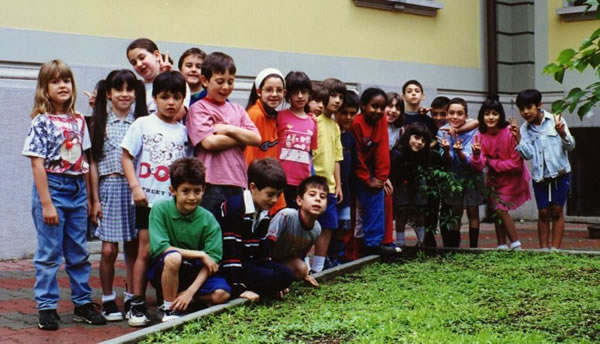Rossella’s five years of elementary school took place at Parco Trotter, where she had also done scuola materna (preschool). We had been spoiled by a great scuola materna experience; elementary was… not so great.
I’m reaching the conclusion that the quality of education hinges almost entirely on the quality of teachers. And there’s the rub. Until recently, becoming a teacher in Italy did not require any teaching qualification. To teach middle or high school, you had to have a college degree (laurea) in the subject you would teach; to teach elementary school, you didn’t even need that much! There were no requirements for teacher training classes or actual classroom experience, and apparently little opportunity for teachers to learn any techniques at all, let alone new ones. This has now changed, but there is a large body of teachers still in the system who cannot be dislodged from their jobs or even required to upgrade their professional qualifications. As far as I can tell, what little they know about teaching, they have learned on their own or from colleagues.
Of course, some people manage to be wonderful teachers without formal teacher training, and some are motivated to learn more about their profession even when not required to. But, without some system of professional qualifications in place, individual capability and motivation guarantee nothing: parents can only hope for fate to assign their kids some of those few, great natural teachers.
We had no such luck.
Parco Trotter had four sections of each grade level, with two “fixed” teachers per section for the major subjects: one taught math and science, the other Italian, history, and geography. These two were supposed to remain with the same section of students from first through fifth grade, and parents had no choice about what section their child was in.
In Rossella’s year, one section was blessed with the kind of teacher beloved by both kids and parents: enthusiastic, involved, creative, and very energetic, especially considering that he was about 60 years old. His class got to do all sorts of fun and inspiring things. Two other sections had teachers who were at least competent, if not wildly original. Ross’ section, however, got the shaft. For administrative reasons, they had about six teachers in the first three years. This profoundly upset many of the parents, who felt it extremely important for the children to have the same teachers for all five years. However, as one friend pointed out from painful personal experience, having the same teacher for five years is not necessarily a good thing – what if she hates you?
I agreed with him on that point, and in any case wasn’t concerned about stability at school; I feel that stability is the responsibility of the parents. I was more interested in teaching ability, but I, too, was doomed to disappointment. Of the two “fixed” teachers we finally ended up with, for 4th and 5th grade, one was merely competent, the other downright embarrassing.
Ross’ grades were poor. Remembering that I, too, had earned mediocre grades through elementary school, I wondered if her problem might be the same as mine had been: sheer boredom. For middle school we decided to find a far more challenging school, hoping that this would get her interested in learning. The school we chose turned out to be the wrong one, but that’s another story.
…I abandoned this article yesterday morning, not sure how to tie it all together with some other thoughts and observations on Italian schools. We were out for lunch (between various house-related errands in Lecco), and with our post-lunch espresso were given sugar packets printed with quotes from Arturo Graf, a late 19th-century Italian poet, critic, and educator. My packet said: “Great is the teacher who, teaching little, sparks in the student a huge desire to learn.” Amen, brother.
next: elementary school exam



